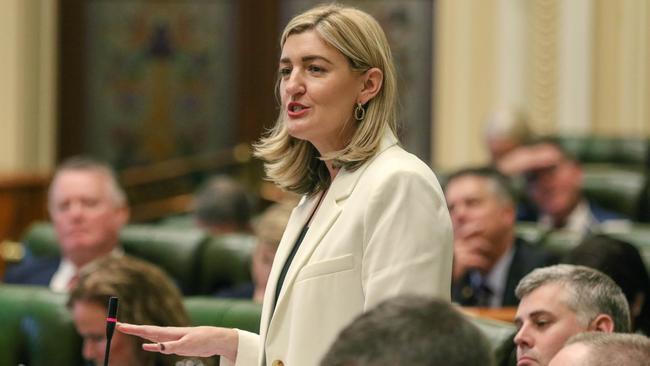Queensland to legalise and regulate sex work after law review recommendations
In the largest shake up to the industry in decades, the state government will sign off on the decriminalisation of sex work in Queensland.

QLD News
Don't miss out on the headlines from QLD News. Followed categories will be added to My News.
Sex work will be brought “out of the dark and properly regulated” Attorney-General Shannon Fentiman has declared, with the state government to today sign off on the decriminalisation of prostitution in Queensland.
In the largest shake up to the industry in decades, State Cabinet will today respond positively to a landmark Queensland Law Reform Commission review into how sex work could be decriminalised that is understood to have made 47 recommendations.
Ms Fentiman reaffirmed the government’s intention to regulate the industry like any other business in an interview with 7 News Brisbane aired on Sunday night.
But the Attorney-General – and the Premier’s office – declined to explain any further on Sunday night, despite repeated requests from The Courier-Mail, noting the need for cabinet sign off.
“Current laws stigmatise sex workers, it increases their vulnerability to exploitation and violence,” Ms Fentiman said on 7 News.
“We need to bring sex work out to off the dark and properly regulate the industry particularly for the safety of workers.”

It is expected further consultation, including with local government, will be undertaken before sex work is decriminalised.
But again, there was no confirmation of that from the government last night.
There are currently just two forms of legalised sex work in Queensland – services provided at a licensed brothel, when a person is working alone from a premise, providing in-house calls, outcall services, or both.
All other forms are illegal, including escort agencies, unlicensed brothels, massage parlours, street workers who publicly solicit, and those who work in small groups.
Women cannot operate in pairs, check in with a colleague before or after calls, work with another person providing security, or employ someone to screen or book clients.
Queensland’s corruption watchdog had suggested regulating sex work like businesses in the aftermath of the Fitzgerald inquiry three decades ago, arguing it would reduce the risk of “serious criminal involvement” and noted the approach of strict control had failed.
But the Goss cabinet of 1992 was unmoved – according to recently unsealed documents, slamming the Crime and Justice Commission’s (CJC) regulation option as an approach which brought “another set of problems” rather than provide a solution “to the problem of prostitution”.
Instead the government chose “strict enforcement” of criminal law toward prostitution, particularly clients and those profiteering from it while pushing for health and social programs that aimed in part to “discourage acceptance” of the world’s oldest profession.
Among the recommendations of the CJC was to let solo sex workers operate out of their homes, as long as they received council planning approval, not unlike how other home businesses operate now.
Originally published as Queensland to legalise and regulate sex work after law review recommendations




